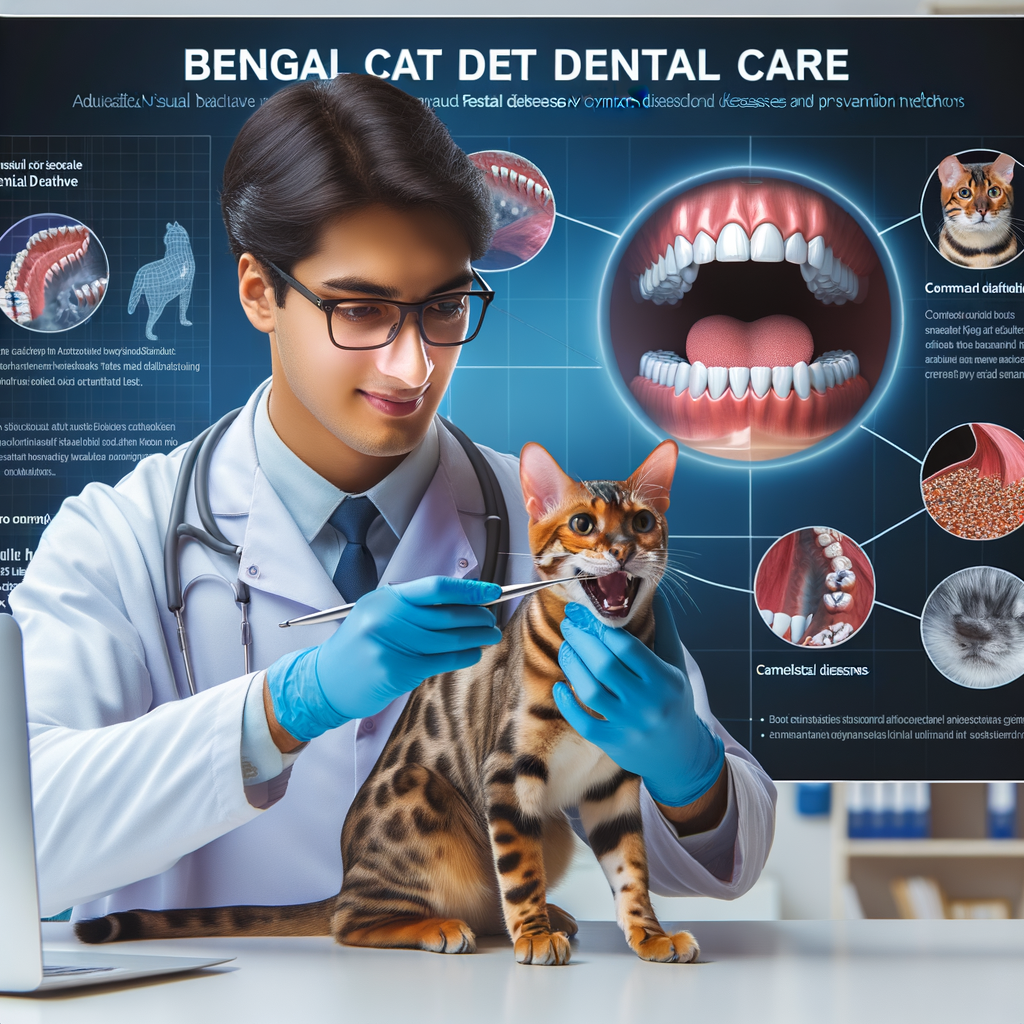
Introduction to Bengal Cat Dental Care
Just like humans, our beloved Bengal cats also need proper dental care. In this article, we will delve into the importance of Bengal cat oral health, common dental problems they face, and the benefits of regular teeth cleaning. Let’s ensure our feline friends keep their bright smiles!
-
- Importance of Bengal Cat Oral Health
Oral health is crucial for the overall well-being of your Bengal cat. Poor dental hygiene can lead to various health issues, such as gum disease, tooth loss, and even heart disease. A healthy mouth allows your cat to eat comfortably and helps prevent bad breath. It’s not just about their smile; it’s about their overall health and happiness.
-
- Common Bengal Cat Dental Problems
Bengal cats, like any other breed, can face several dental problems. The most common ones include gingivitis, periodontal disease, and tooth resorption. Gingivitis is inflammation of the gums, while periodontal disease affects the structures supporting the teeth. Tooth resorption, on the other hand, is a condition where the cat’s body begins to destroy its own teeth. These conditions can cause discomfort and pain, affecting your cat’s quality of life.
-
- Benefits of Regular Bengal Cat Teeth Cleaning
Regular teeth cleaning is a preventive measure that can save your Bengal cat from many dental problems. It helps remove plaque and tartar build-up, which are the main causes of gum disease. Regular cleaning can also help detect dental issues early, allowing for timely treatment. Plus, it keeps your cat’s breath fresh and their smiles bright!
Understanding and caring for your Bengal cat’s dental health is a crucial part of responsible pet ownership. In the following sections, we will explore more about Bengal cat dental diseases and practical tips for maintaining their oral health. Stay tuned!
Understanding Bengal Cat Dental Diseases
Just like humans, Bengal cats can also suffer from various dental diseases. Understanding these conditions can help you take better care of your feline friend’s oral health. In this section, we will discuss three common dental diseases that Bengal cats often face.
Common Dental Diseases in Bengal Cats
- GingivitisGingivitis is a common dental disease in Bengal cats. It is an inflammation of the gums often caused by the buildup of plaque. Symptoms include red, swollen gums and bad breath. If left untreated, gingivitis can progress to more serious conditions like periodontal disease.
- Periodontal DiseasePeriodontal disease is a severe form of gum disease that affects the structures supporting the teeth. It is often a result of untreated gingivitis. In Bengal cats, periodontal disease can lead to tooth loss and may even affect their overall health.
- Tooth ResorptionTooth resorption is another common dental disease in Bengal cats. It occurs when the cat’s body starts to absorb the tooth, leading to painful lesions. The exact cause of tooth resorption in cats is unknown, but it can lead to severe discomfort and difficulty in eating.
Understanding these dental diseases is the first step towards ensuring your Bengal cat’s oral health. In the next section, we will discuss how to prevent these conditions and maintain your cat’s bright smile.
Preventing Dental Diseases in Bengal Cats
Keeping your Bengal cat’s teeth healthy is a crucial part of their overall wellbeing. There are three primary ways to prevent dental diseases in Bengal cats: regular dental check-ups, a proper diet, and regular teeth cleaning. Let’s explore these methods in detail.
-
- Regular Dental Check-ups
Regular dental check-ups are a must for maintaining your Bengal cat’s dental health. These check-ups allow the vet to spot any potential dental issues early and treat them before they become severe. Ideally, your Bengal cat should have a dental check-up at least once a year. During these check-ups, the vet will examine your cat’s teeth and gums for signs of diseases like gingivitis, periodontal disease, and tooth resorption.
-
- Proper Diet
A proper diet plays a significant role in preventing dental diseases in Bengal cats. Dry cat food can help reduce plaque buildup on your cat’s teeth. Additionally, there are special dental diets available that are specifically designed to promote dental health. These diets can help keep your cat’s teeth clean and healthy. However, it’s essential to consult with your vet before making any significant changes to your cat’s diet.
-
- Regular Teeth Cleaning
Regular teeth cleaning is another essential step in preventing dental diseases in Bengal cats. Brushing your cat’s teeth at home can help remove plaque and prevent tartar buildup. Ideally, you should brush your cat’s teeth daily, but if that’s not possible, aim for at least three times a week. Use a cat-friendly toothpaste and a soft-bristled toothbrush designed for cats. Remember, never use human toothpaste as it can be harmful to cats.
In conclusion, preventing dental diseases in Bengal cats requires a combination of regular dental check-ups, a proper diet, and regular teeth cleaning. By following these steps, you can help ensure your Bengal cat maintains a bright and healthy smile.
Practical Bengal Cat Dental Health Tips
Keeping your Bengal cat’s teeth clean and healthy is crucial for their overall well-being. Here are some practical tips to help you maintain your Bengal cat’s dental health.
Teeth Cleaning Tips for Bengal Cats
Regular teeth cleaning is essential in preventing dental diseases in Bengal cats. Here are some tips to help you effectively clean your Bengal cat’s teeth:
-
- Choosing the right toothbrush
It’s important to choose a toothbrush that’s specifically designed for cats. These toothbrushes are smaller and softer, making them more comfortable for your Bengal cat. Look for a toothbrush with a long handle to easily reach the back teeth.
-
- Proper brushing technique
Start by gently lifting your cat’s lips to expose the teeth. Then, using the cat toothbrush, brush in a circular motion, focusing on the gum line. Remember to be gentle to avoid hurting your cat. It’s recommended to brush your cat’s teeth daily, but if that’s not possible, aim for at least three times a week.
-
- Choosing the right toothpaste
Never use human toothpaste for your Bengal cat as it can be harmful to them. Instead, choose a toothpaste specifically designed for cats. These toothpastes come in flavors that cats love, like chicken or fish, making the brushing experience more enjoyable for them.
Remember, maintaining your Bengal cat’s dental health requires consistency. By following these tips, you can help ensure your Bengal cat has a healthy and bright smile.
Diet Tips for Bengal Cat Dental Health
One of the key aspects of maintaining your Bengal cat’s dental health is their diet. What your cat eats can significantly impact their oral health. Here are some diet tips to help keep your Bengal cat’s teeth healthy.
-
- Choosing the right food
Not all cat foods are created equal. Some are better for your cat’s dental health than others. Dry food, for example, can help scrape off plaque and tartar from your cat’s teeth. However, it’s essential to choose a high-quality dry food that’s specifically designed for dental health. These foods often have a unique shape and texture that helps clean your cat’s teeth as they chew.
-
- Benefits of dental treats
Dental treats are another excellent tool for maintaining your Bengal cat’s dental health. These treats are designed to clean your cat’s teeth and freshen their breath. They can help reduce plaque and tartar build-up, and many cats love the taste. However, remember that treats should not replace regular meals, but rather supplement them.
-
- Importance of hydration
Water plays a crucial role in your cat’s overall health, including their dental health. Staying hydrated helps your cat produce saliva, which naturally cleans their teeth. Encourage your cat to drink plenty of water by providing fresh, clean water at all times. You might also consider investing in a cat water fountain, as many cats prefer running water.
Remember, a healthy diet is just one part of maintaining your Bengal cat’s dental health. Regular teeth cleanings and check-ups with your vet are also essential. By taking a proactive approach to your cat’s dental health, you can help ensure they have a bright, healthy smile for years to come.
Bengal Cat Dental Health Guide: Case Studies
Let’s dive into real-life examples that illustrate the importance of dental care in Bengal cats. These case studies will provide you with practical insights into preventing, overcoming, and maintaining dental health in your Bengal cat.
-
- Case Study 1: Preventing Dental Issues in Bengal Cats
Meet Bella, a Bengal cat who has never had a dental issue. Bella’s owner, Jane, attributes this to a consistent dental care routine from a young age. Jane brushes Bella’s teeth daily using a cat-friendly toothpaste and a soft-bristled toothbrush. She also provides dental chews that help clean Bella’s teeth and freshen her breath. Regular vet check-ups ensure that any potential issues are caught early. This proactive approach has kept Bella’s teeth healthy and strong.
-
- Case Study 2: Overcoming Bengal Cat Dental Diseases
Next, we have Max, a Bengal cat who suffered from periodontal disease. Max’s owner, Sam, noticed that Max was having trouble eating and had bad breath. A visit to the vet confirmed that Max had gum disease. Sam followed the vet’s advice for treatment, which included professional cleaning and antibiotics. Sam also started a rigorous dental care routine for Max, including daily brushing and regular dental check-ups. Over time, Max’s dental health improved significantly.
-
- Case Study 3: Successful Bengal Cat Tooth Care Routine
Finally, let’s look at Daisy, a Bengal cat with a successful tooth care routine. Daisy’s owner, Lisa, brushes Daisy’s teeth daily and uses dental chews as a supplement. Lisa also ensures Daisy has regular dental check-ups at the vet. This routine has not only kept Daisy’s teeth healthy but also helped her overcome a minor dental issue early on. Lisa believes that consistency is key to a successful dental care routine.
These case studies show that a consistent and proactive approach to dental care can prevent dental issues, overcome diseases, and maintain overall dental health in Bengal cats. Remember, it’s never too late to start a dental care routine for your Bengal cat.
Conclusion: Maintaining Your Bengal Cat’s Bright Smile
As we wrap up our discussion on Bengal cat dental care, it’s important to remember that a healthy mouth is key to a happy, vibrant Bengal cat. Let’s summarize the key points we’ve covered.
-
- Key takeaways on Bengal cat dental care
Proper dental care for your Bengal cat involves regular brushing with a cat-friendly toothpaste, providing dental-friendly toys and treats, and maintaining a balanced diet. It’s also crucial to be aware of the signs of dental diseases, such as bad breath, drooling, and difficulty eating.
-
- Importance of regular vet visits
Regular vet visits are essential for early detection and treatment of dental diseases. Your vet can perform a thorough dental examination and professional cleaning, which can prevent serious dental issues. Remember, prevention is always better than cure.
-
- Commitment to your Bengal cat’s dental health
Lastly, maintaining your Bengal cat’s dental health requires a commitment. It’s not just about brushing their teeth once in a while, but about making dental care a part of their daily routine. Your Bengal cat relies on you for their health and happiness, so let’s make sure we give them the best care possible.
In conclusion, taking care of your Bengal cat’s teeth is just as important as taking care of their coat or diet. With regular care and attention, you can ensure that your Bengal cat maintains a bright, healthy smile for years to come.














